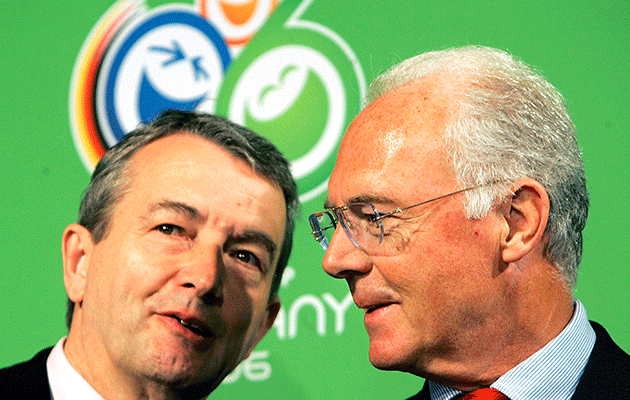Franz Beckenbauer, Wolfgang Niersbach and Theo Zwanziger – Germany’s three most powerful football leaders over the past decade – have been effectively put on trial by FIFA’s ethics committee over the awarding of the 2006 World Cup finals.
The trio plus former German federation officials Helmut Sandrock, Horst R Schmidt and Stefan Hans have been notified of the opening of ‘formal proceedings’ which could lead to reprimands and/or fines and/or suspensions.
Niersbach is the only one of the six currently holding senior office in the game as an executive committee member of both world football federation FIFA and of European governing body UEFA.
His positions now appear untenable but Niersbach, while protesting his innocence, may strive to cling on after the manner in which banned UEFA president Michel Platini is refusing his concede his own status in separate and unrelated ethics proceedings.
Niersbach and Zwanziger are former presidents of the DFB while Schmidt and Sandrock are former general secretaries and Hans a former chief financial officer.
Beckenbauer, the former World Cup-winning captain and manager and who was head of both the bid and organising committees of the 2006 World Cup, was cautioned and fined SFr7,000 only last month for obstructing the inquiry into the awards of the 2018 and 2022 World Cups. He had been a member of the FIFA exco which controversially voted the finals to Russia and Qatar in December 2010.
The ethics action concerns mysterious payments in and out of the German federation’s accounts both before and after the award of the finals under circumstances which were controversial even at the time in July 2000.
In one sense the German federation, from whose leadership Niersbach resigned last autumn, assisted by FIFA by commissioning the Freshfields legal firm to undertake an independent inquiry into the scandal. This report was duly passed on to the FIFA ethics committee.
However the fact that the ethics committee has gone to work with such alacrity will prompt inevitable questions from critics about why the circumstances of the awards of the 2018 and 2022 World Cups have not been submitted to similar scrutiny.
The conclusion of the Freshfields inquiry was that it was impossible to pass definitive judgment either way on whether bribes had been used to secure 2006 host rights for Germany. However the ethics committee need concern itself only with the broader scope of the conduct of Beckenbauer, Niersbach, Zwanziger and their associates back then.
Zwanziger had been treasurer of the DFB and then joint president alongside veteran politician Gerhard Mayer-Vorfelder in 2006. After the World Cup Zwanziger took over the sole presidency which he held until he was ousted by Niersbach in the spring of 2012.
At that time Zwanziger was also a member of the FIFA exco, having succeeded Beckenbauer in May 2011. An outspoken critic of the 2022 World Cup award to Qatar he was voted out of both UEFA and thus FIFA governing boards last year.
Niersbach was communications director of the 2006 bid and organising committees. He later became general secretary and chief executive of the DFB before retiring on a lucrative pension which ‘freed’ him to take over the honorary position of president from the embittered Zwanziger.
Schmidt, for years, was considered as perhaps the most able football administrator in European if not world football until being succeeded by Niersbach in 2007. Schmidt then served as ‘progress chaser’ for FIFA in South Africa ahead of the 2010 World Cup finals.
Hans was dismissed by the DFB last year over the payments issue and is currently suing for wrongful dismissal. Sandrock resigned as general secretary last month just ahead of publication of the Freshfields report.
All six men have denied all wrongdoing. The pressure has told on Beckenbauer. He stepped down earlier this month from his long-running role as a TV football analyst after a wretched personal 12 months which included the death from cancer of his son Stephan.







